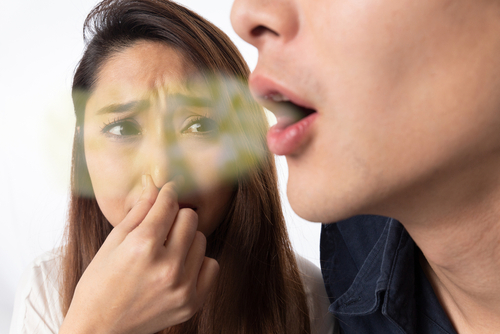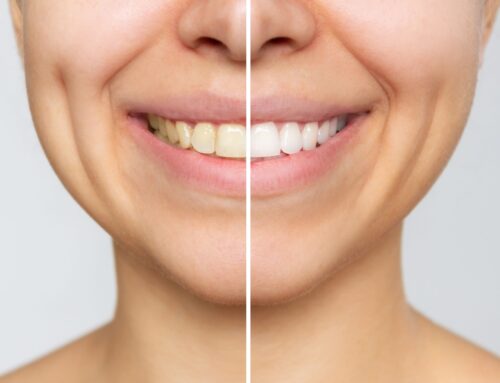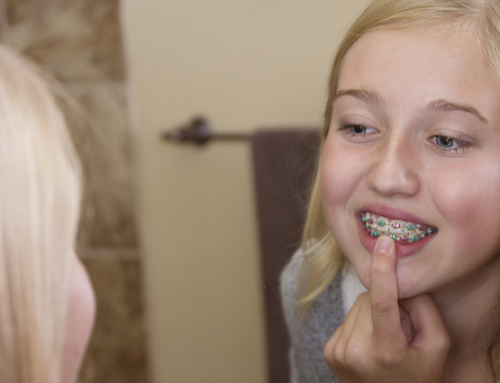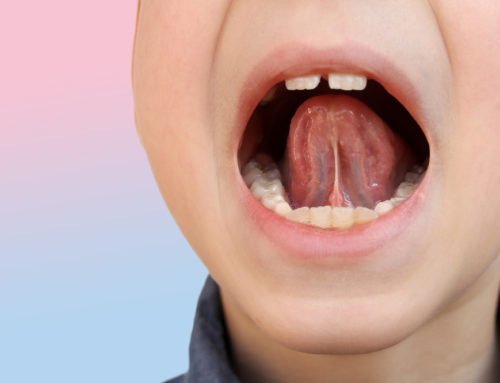Mouth Breathing & Your Oral Health
Mouth breathing is necessary when you have a cold, flu, or allergies that cause congestion and make it impossible to breathe through your nose. However, chronic mouth breathing is bad because it can often lead to problems, like dry mouth, bad breath, sleep apnea, and more.
At its core, mouth breathing occurs when individuals can’t breathe through their noses, so they rely on taking air through their mouths. This can happen due to nasal obstructions or other health issues, and it’s not just a temporary inconvenience. It can lead to sleep disorders that affect daily life and even change the structure of people’s faces.
Some people breathe through their mouths only when they are asleep or have nasal congestion. However, some people are mouth breathers on a day-to-day basis. Allergies often give way to mouth breathing, as well as issues such as chronic nasal obstruction and even stress and anxiety.
The most common cause of mouth breathing is nasal obstruction, which leads to difficulty breathing, poor sleep and poor oral health.
Unfortunately, other harmful health concerns contribute to mouth breathing as well. Many people don’t realize mouth breathing can actually be a complex health concern and should be checked out by your dentist and physician.
Healthcare providers often treat mouth breathing with surgery or medication to enable individuals to breathe through their noses again, addressing both the symptom and its underlying cause. Recognizing and treating mouth breathing early can prevent the long-term impacts on both your health and facial structure.
Is Mouth Breathing Bad?
Those who breathe through their nose are less likely to have poor posture, clench their teeth, snore at night, or develop a bad facial profile. Nose breathing allows the nose to filter and humidify air as it enters the body.
Another key function of the nose is to produce nitric oxide, which helps the lungs absorb and transport oxygen throughout the body. Nitric oxide also improves the immune system because it is an antifungal, antiviral, antiparasitic, and antibacterial.
When air bypasses the nose and enters through the mouth, the air is more dry. In your mouth, saliva washes bacteria out. Not only do bacteria thrive in a dry environment, but a lack of cleaning saliva leads to cavities, tooth decay, and gum disease.
In addition, mouth breathing can also lead to dehydration, as the body loses moisture through evaporation.
How Does Mouth Breathing Affect Dental Health?
Although mouth breathing may seem harmless, it can create a variety of oral health issues over time. Many people don’t realize that how you breathe plays a big role in the health of your teeth, gums, and facial structure development. Some of the signs your dentist may recognize include:
- Dry Mouth: Bacteria thrives in a dry mouth because saliva isn’t washing away food particles or neutralizing acids in your mouth, leading to an increased risk of gum disease and cavities.
- Abnormal Facial Development in Children: As children grow, their facial development relies on their tongue to create pressure on the roof of their mouth. Without this tongue posture, children can develop a long face shape, narrow upper jaw and dental arch, an open bite or crossbite, and underdeveloped nasal passages.
- Orthodontic Issues: Mouth breathing can lead to improper tongue posture, which can affect how your teeth align and cause overbites, open bites, and crossbites.
- Sleep-Related Dental Concerns: Mouth breathing can lead to snoring, obstructive sleep apnea, worn-down teeth, and even enlarged tonsils.
- Halitosis: As bacteria lingers in your mouth, it can produce odor that leads to chronic bad breath.
If you present with symptoms of mouth breathing, your dentist can refer you for a sleep study to determine if you breathe through your mouth as you sleep. Your dentist can also recommend being seen by an ENT to determine if there is an underlying cause for your mouth breathing. Children can see a dentist to improve mouth breathing through orthodontic intervention that can make it easier for them to breathe through their nose. Depending on the cause of your mouth breathing, your dentist may even be able to create oral appliances to help keep your airway open as you sleep as a CPAP machine alternative.
Why You Should Breathe Through Your Nose
- Tiny nose hairs, called cilia, filter and trap small particles in the air, like pollen, dust, and small bugs.
- The nose humidifies the air to prevent dryness of the lungs and bronchi.
- The nose warms cold air up to body temperature. Lungs thrive when the air is warm.
- Nose breathing increases oxygen uptake by adding resistance to the airflow and maintaining the elasticity of the lungs.
13 Signs and Symptoms of Mouth Breathing
How do you know if someone may be suffering from the ill effects of a mouth breather? There are several signs and symptoms that tell you whether someone you know or you yourself suffer from poor breathing.
- Crowded teeth
- Dry mouth
- Dry lips
- Red or inflamed gums
- Cavities
- Bad breath
- Sore throat
- Digestive upset
- Chronic fatigue
- Short attention span
- Restlessness or hyperactivity
- Decreased productivity
- Snoring
- Morning headaches
- Frequent airway infections
- Cold symptoms
- Health Issues Caused By Mouth Breathing
- Mouth breather chin and mouth breather jaw from improper facial growth
Mouth breathing affects a wide range of individuals, including both adults and children. Healthcare providers estimate that between 10% and 25% of children experience mouth breathing, which can have significant implications on their development.
Mouth breathing can alter your child’s face shape and jaw position. How? The Human Growth Hormone (HGH) releases during deep sleep. That hormone affects a child’s brain development and long bone growth. Since mouth breathing disrupts deep sleep, those who breathe through their mouth can suffer from improper growth.
This impairment is most often seen in children because of their rapid growth compared to adults. Improper facial growth often leads to long, narrow faces with regressed cheekbones, lower jaw, and chin. Because of this, teeth may become crooked, while smiles may appear gummier.
Even poor posture can result from the facial structure and skeletal issues connected with chronic mouth breathing. In order to breathe more easily, the airway must be open. Hunched shoulders and a forward-leaning head help to open the airways while negatively influencing posture.
Beyond these developmental concerns, mouth breathing can significantly impact daily life through sleep disorders. When deep sleep is disrupted, it affects the quality of rest. This can lead to daytime fatigue, reduced concentration, and a decline in overall productivity. Over time, these sleep disturbances may set the stage for long-term problems, affecting both children and adults.
By addressing mouth breathing early, you can help prevent these potential issues, ensuring a healthier development for your child and a more productive daily life for everyone.
What Can You Do About Mouth Breathing?
Fortunately, many times healthcare providers can mitigate these effects by addressing the underlying cause of mouth breathing. Here’s what you might expect in terms of treatment:
- Surgical Solutions: If tissue is blocking the airway, surgery may be necessary to remove it, allowing for normal breathing patterns to resume.
- Medication: For those dealing with chronic stuffy noses due to allergies, medications can help reduce swelling and improve airflow.
By tackling the root problems, these interventions not only improve breathing but also help prevent long-term developmental issues associated with mouth breathing.
Diagnosis of Mouth Breathing: Common Tests Healthcare Providers Use
Healthcare providers use several tests to determine if a patient is breathing through their mouth rather than their nose. Here are some of the commonly used methods:
Lip Seal Test
In this simple assessment, the provider checks if you can breathe comfortably with your mouth closed. Difficulty maintaining lip seal may indicate habitual mouth breathing.
Mirror Test
This involves holding a mirror under your nose while you breathe. If the mirror fogs up, it suggests you’re breathing through your nose. Lack of fogging may indicate mouth breathing.
Water Test
This test examines your ability to retain water in your mouth while breathing through your nose. If you struggle to keep the water in your mouth, it might suggest a tendency toward mouth breathing.
By using these tests, healthcare providers can assess and diagnose mouth breathing effectively, allowing for appropriate treatment plans.
Effective Treatments for Mouth Breathing
Mouth breathing often results from blocked nasal passages. For children, this can be due to enlarged adenoids. To address such issues, healthcare providers may suggest surgical interventions:
- Adenoidectomy: This procedure involves the removal of swollen adenoids, which can help open up the airway and reduce mouth breathing.
- Septoplasty: When a deviated septum causes breathing difficulty, this surgery realigns the nasal septum to improve airflow.
In cases where chronic colds, sinus infections, or allergies are the culprits, healthcare professionals frequently prescribe medications to alleviate nasal congestion, allowing individuals to breathe more comfortably through their noses.
Treatments are tailored to the underlying cause, ensuring the most effective approach to restoring normal breathing patterns.
Mouth Breathing & Speech Impediments
Breathing issues can change the way the tongue works, known as a “tongue thrust,” which negatively affects speech, swallowing, and chewing.
The tongue applies pressure to the roof of the mouth during speech and swallowing. When a child grows, the pressure their tongue applies to the hard palate and upper teeth grows the palate wider. Since the hard palate and base of the nose are the same, a wider palate increases the size of the nasal passageways. If the palate does not expand enough for air to come through the nose, then the child will breathe through their mouth.
A small palate can also lead to tongue thrust. With tongue thrust, the tongue protrudes, or pushes forward, during speech and swallowing. As a result, mouth-breathing children between the ages of 4 and 12 have speech alterations and impediments such as sound omissions, lisps, and articulatory disorders. Depending on the severity of the speech impediment(s), a speech pathologist may be necessary to correct speech alterations and slurs.
Teeth also become affected by tongue thrust and mouth breathing. Tooth stability weakens, which can change tooth alignment and cause crooked teeth. Even after braces removal, mouth breathers experience orthodontic relapse and may need braces again.
These issues could lead to a child feeling self-conscious.
Mouth Breathing vs. ADD and ADHD
Because mouth breathing leads to chronic fatigue, even with eight hours of sleep, your child may have symptoms, like hyperactivity, restlessness and a short attention span, that look like ADD or ADHD. Furthermore, children who lack quality sleep may be moody, emotionally explosive, or aggressive.
Since these symptoms mirror ADD or ADHD, doctors often misdiagnose children who simply have breathing problems.
Snoring & Sleep Apnea Caused By Mouth Breathing
Because mouth breathing is most often a result of nasal obstruction, sleep issues are common. Snoring and nights filled with poor sleep are more prevalent in mouth breathers as well. The resulting fatigue and headaches can be debilitating! Sleep is vital at all ages, and anything that inhibits quality sleep should be properly addressed.
Also, this can further affect and aggravate sleep apnea. Untreated obstructive sleep apnea can cause depression, anxiety, weight gain, and high blood pressure. Therefore, mouth breathing and sleep apnea can be a deadly combo. To breathe better at night, you treat sleep apnea with an oral appliance like MAD.
Sleeping With Your Mouth Open
When you sleep, your body relaxes, and your breathing becomes shallow. This can cause your mouth to fall open, which can lead to a number of problems.
First, it can cause you to snore. Snoring occurs when the airway is obstructed, and mouth breathing is one of the most common causes of obstruction. In addition, mouth breathing can dry out your mouth, leading to bad breath and an increased risk of gum disease.
Second, when oxygen is inhaled through the mouth rather than the nose, your blood is not actually getting all of the oxygen that it needs. This can lead to heart problems and other health issues.
Finally, sleeping with your mouth open can also lead to teeth grinding (bruxism). If you regularly wake up with a headache or a sore jaw, it may be because you’re grinding your teeth at night. If you’re concerned about any of these issues, talk to your doctor or dentist. They can help you find ways to reduce the effects of mouth breathing.
What Causes Mouth Breathing?
In order to correct mouth breathing, you need to first determine the cause. Generally speaking, a deficiency in the size of the nasal passageway and a poorly functioning tongue and airway leads to chronic mouth breathing.
Your body needs oxygen. So, if there is not enough space in the nose for air to flow through to the lungs, then someone will breathe through the mouth for oxygen. Thankfully, there are simple ways to enlarge nasal passages to let air through.
The first suggestion your dentist might give to expand the nasal passage is to use a palatal expander. Because the palatal bone (maxilla) and the base of the nose are the same, expanding the palate increases space for nasal breathing.
Orthodontic expanders that widen the palate usually do a good job of helping those with a mouth breathing habit to take in air through the nose. However, surgery may be necessary in some cases after using the expander. If enlarged nasal turbinates cause nasal congestion, they will need to be reduced in size through surgery.
What Can Be Done to Help Limit Mouth Breathing?
Even with enlarged nasal passages, mouth breathers need to strengthen their tongue, improve the tongue’s posture into the palate with suction. Furthermore, diaphragm and rib cage muscles need more strength to correctly let air into the lungs. Below are exercises to practice strengthening muscles and posture related to nose breathing.
Practice Breathing Through the Nose
This exercise improves nasal breathing, which helps stabilize the airway during sleep
- Inhale through the mouth and relax the jaw.
- Then take a finger or knuckle and close one nostril.
- Slowly exhale through the open nostril.
- Do this about 10 times, alternating between nostrils.
- You may notice that one nostril tends to be more blocked than the other. Try to breathe through the blocked nostril.
Tongue Exercises to help
- Tongue Slide
This exercise will help strengthen the muscles of the tongue and throat.
Place the tip of your tongue on the back of your upper front teeth. Slowly slide the tongue back with the tip moving along the roof of the mouth. Repeat 5 to 10 times.
- Tongue Stretch
This exercise will help increase the strength of the tongue.
Pull your tongue out as far as you can. Try to touch your chin with your tongue while looking up at the ceiling. Hold for 10 to 15 seconds and gradually increase the time. Repeat 5 times.
- Push the Tongue Up
This exercise will help improve the tone and strength of the tongue and soft palate.
Bring the tongue upwards against the roof of the mouth and press the whole tongue into it. Hold this position for 10 seconds. Repeat 5 times.
- Tongue Thrust Down
This exercise will help improve the timbre and strength of the tongue and soft palate.
Place the tip of your tongue against your lower front teeth, then push your tongue back down to the floor of your mouth. Hold this position for 10 seconds. Repeat 5 times.
How to Prevent Mouth Breathing
The key to prevent mouth breathing is to make sure you can breathe through your nose properly. When you decrease the risk of nasal congestion, you can help stop a mouth breathing habit.
How to Prevent Mouth Breathing in Adults
Mouth breathing can lead to various issues like bad breath, dry mouth, and interrupted sleep. While it may not always be possible to prevent mouth breathing entirely, there are steps you can take to reduce its occurrence and impact.
- Identify Underlying Causes: The first step in prevention is understanding the root cause. Allergies, nasal blockages, or deviated septum are common culprits. Consulting a healthcare provider can help diagnose these issues.
- Practice Good Nasal Hygiene: Regularly clean your nasal passages with a saline nasal spray or rinse. This can help reduce congestion and promote easier nasal breathing.
- Address Allergies: If allergies are a factor, consider using antihistamines or decongestants under professional guidance. These can help keep your nasal passages clear.
- Humidify the Air: Dry air can exacerbate mouth breathing. Using a humidifier in your bedroom can maintain moisture levels, making nasal breathing more comfortable.
- Breathing Exercises: Practice breathing techniques or exercises that encourage nasal breathing. Yoga and other relaxation exercises can also help improve your overall breathing patterns.
- Change Sleeping Positions: Sleeping on your back can sometimes promote mouth breathing. Try sleeping on your side to naturally encourage nasal breathing.
- Consider Treatment Options: In some cases, medical treatments like CPAP therapy for sleep apnea or corrective surgery may be necessary.
- Seek Professional Help: If self-help measures don’t alleviate the issue, visit an ENT specialist or a sleep therapist. They can recommend treatments tailored to your situation.
- Monitor for Improvement: Keep track of your breath as you make these changes. Improved nasal breathing should reduce symptoms like dry mouth and unexplained tiredness.
By proactively addressing the factors contributing to mouth breathing, you can significantly improve your quality of life and overall health.
Ways to Improve Nose Breathing
- Use saline mist on long flights or cruises
- Use saline mist and nasal sprays and decongestants or allergy medications at the first sign of an allergy or cold
- Keep your home clean and allergen-free
- Install air filters in heating and air conditioning (HVAC) systems to prevent the spread of substances and allergens in your home
Contact Your Dentist at Snodgrass-King for More Help for Mouth Breathing
Thankfully, mouth breathers can learn to change this habit. Ensure that your child’s presumed “ADD” or “ADHD” is not actually a lack of focus caused by poor sleep due to breathing issues. Look for the previously mentioned signs and symptoms, and take action. Breathing issues can be corrected, but it is easier to correct when caught early. Parents, keep an eye out and call us or book online to schedule a thorough dental exam for your child.








